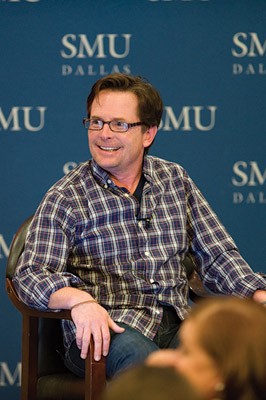
Actor and Parkinson’s disease activist Michael J. Fox speaks at the Tate Lecture Series Student Forum Tuesday afternoon in the Hughes-Trigg Ballroom. (CLAYTON T. SMITH/ SMU)
Before going into his life story, Michael J. Fox, known as Alex P. Keaton to some and as Marty McFly to others, re-assured a filled McFarlin Auditorium that the hover board doesn’t exist.
As part of the Tate Lecture Series, this year’s Tolleson Lecture featured the known actor and author as a speaker to offer his story on how he keeps “looking up” through Parkinson’s Disease.
Aside from “Where can I buy a hover board?” one of the most common questions Fox receives, as
he said, is what the “J” in his name stands for. He claimed that he always gets a “polite laughter” when he replies that it stands for “geniune.”
Fox—whose middle name is Andrew—insisted on the name change when another actor possessed the name Michael Fox when he came to Hollywood.
“I hesitate to call myself, Michael… A. Fox,” he said.
Luckily, he came to the J. as a replacement after watching Michael J. Pollard in Bonnie and Clyde.
At 16, Fox, who looked about 12, auditioned for a TV show in his hometown in British Columbia, Ontario.
After making about $600 a week in the show, he decided to drop out of high school and move to Hollywood.
“Being a poor, starving actor is a lot more fun in retrospect,” he said.
In his early acting days, he had to clean dishes in his shower while quitting eating regularly and avoiding the IRS.
“In fact, I sold out my sectional couch section by section,” he said. “And it was to the same guy.”
According to Fox, days before taking himself and his few belongings back up North, he got a call back for a new TV show, “Family Ties.”
He got a six-figure offer to play the young, witty Republican. The rest of his career was fame.
“I filmed ‘Back to the Future,’ and nothing was ever the same,” he said.
The girls, friends and money kept coming in.
“People ask if I watch ‘Entourage,’ I say, I lived ‘Entourage,'” he told his audience.
The best decision he felt he ever made was marrying his wife. One day in 1991, as things were still rolling well for him and his family, Fox noticed a change.
“There was a slight, constant tremor in my pinky finger,” he said, “and I couldn’t stop it.”
Thinking it was from a hangover from a fun night before, he didn’t think much of it at the moment.
“I’d keep it still for four or five seconds, but like a cheap wind up toy, it’d start up again,” he said.
A neurologist ran tests and gave him the results, “flat out,” as he said. Fox then got a second opinion. And third. And a fourth. And Fox then knew he really had to deal with the disease.
He said that while it took him time to accept it himself, it took the longest to admit it to the public.
“That was the last step in owning up,” he said of releasing his condition to the public in 1998.
He wasn’t surprised when he turned on MSNBC afterward.
“When they play you in slow motion,” he said jokingly, “you know you’re either dead or under indictment.”
Fox started the Michael J. Fox Foundation for Parkinson’s Research purely to help the development in finding cures for the disease, stating that they didn’t start it to focus on financial growth.
“The Fox Foundation was going into business to go out of business,” he said.
Fox slipped on his glasses before answering a few questions from his audience.
When asking where he would go if he had his own time machine—whether or not it was in a Delorean—he had a simple response.
“I’m more curious about the future,” he said, “but I’ll wait until we get there.”








